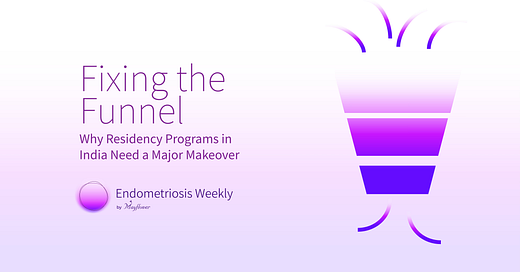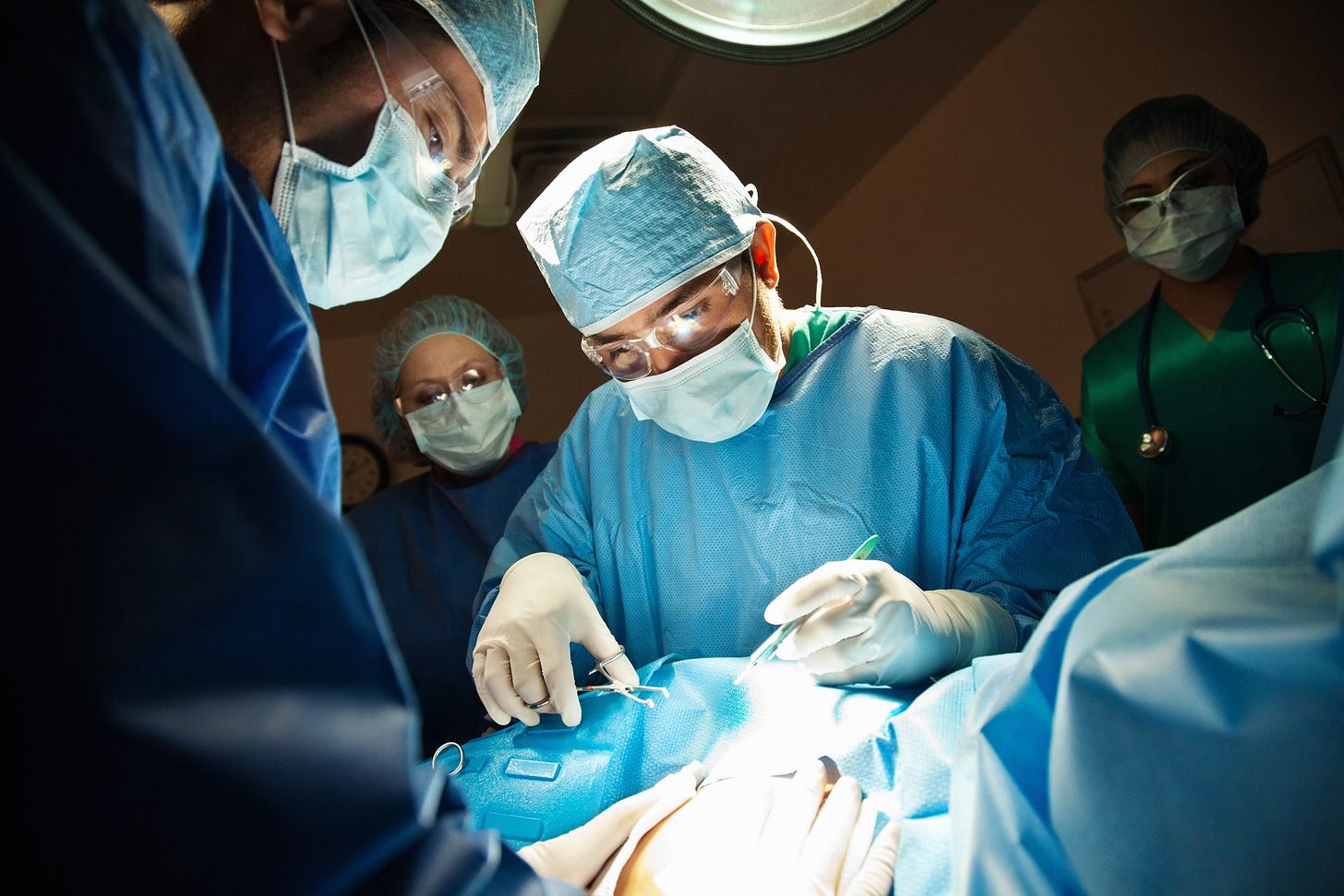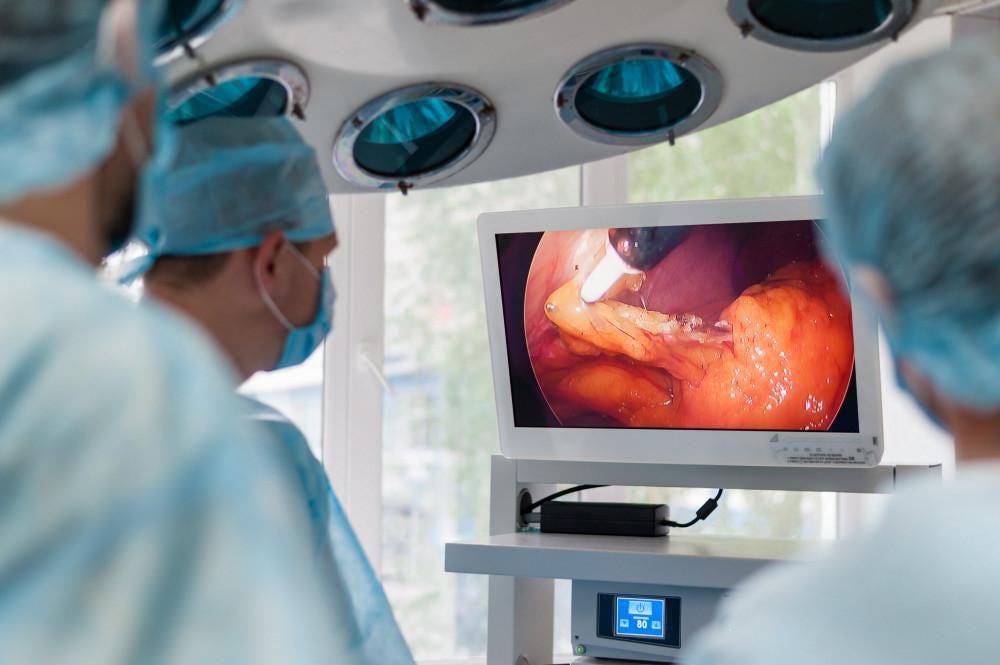Fix the Funnel: Why Residency Programs in India Need a Major Makeover
Note: Apologies for a delayed delivery of this week’s edition. A busy OT schedule and bad health put us behind. This shall not happen again.
Before we begin this week’s edition, it’s important to address the times we are living in. No one is shielded from the news of India’s response to the terrorist attack and the escalation that has followed. As a community of professionals who save lives for a living, we cannot be grateful enough that someone is looking after our lives too. The valour of our troops is unparalleled and it gives us the courage and strength we need. Especially now. Jai Hind.
With that, let’s begin our edition for the day.
Ask any gynaecologist trying to grow their business beyond themselves, trying to recruit surgeons from the field and the complaints are almost predictable. There are no good surgeons in the market who are young, skilled, and willing to contribute. You can travel from Kashmir to Kanyakumari and Gujarat to Arunachal and the problem remains the same.
Despite the increasing demand for minimally invasive procedures, many gynecology residents in India graduate with limited hands-on experience in laparoscopy. This gap not only affects patient outcomes but also places additional burdens on senior surgeons who must supervise or redo procedures, leading to inefficiencies and potential complications.
A Reality Check
Residency training today might feel less like hands-on learning and more like binge-watching surgical videos on YouTube, except with fewer popcorn breaks.
Freshly minted gynecologists emerging from residency often showcase significant skill gaps, especially in laparoscopic surgery. Of the experiences we’ve had at Mayflower, here are the top ones:
1. Limited Hands-on Experience:
Many residents graduate having observed numerous laparoscopic surgeries but having performed very (very) few independently. The result? Surgeons who are more comfortable with PowerPoint than with ports and probes.
2. Deficient Advanced Surgical Skills:
Complex laparoscopic techniques like suturing at difficult angles, managing adhesions near critical organs, and handling advanced deep infiltrating endometriosis cases remain underdeveloped. A lack of structured and repeated practice, combined with a lack of strong fundamentals, leaves new surgeons hesitant in the face of complex surgeries.
3. Inadequate Exposure to Emergency Management:
The most difficult part of treating endometriosis is keeping calm in the face of uncertainty. Handling unexpected intra-operative scenarios requires not just theoretical knowledge but real-time experience and situational awareness. Unfortunately, limited residency exposure leaves many new surgeons ill-equipped to manage such situations confidently.
4. Poor Familiarity with Emerging Technology:
Robotic-assisted surgery, 3D laparoscopic systems, and other advanced tech are becoming commonplace globally—but in India, fresh surgeons often graduate unfamiliar with these tools. This makes training post residency indispensable. They're essentially handed an iPhone after training on a Nokia 1100.
Addressing these gaps isn't just beneficial—it's essential. Otherwise, we're merely handing surgeons a diploma and hoping they learn the ropes (or scopes) on their own time.
Bridging the Surgical Training Gap
Complaining doesn’t solve anything and skilled surgeons is a NATIONAL NEED. Here’s how we think we can fix it.
Below are four substantial recommendations designed specifically to elevate gynecology residency programs in India:
1. Structured Curriculum Integration
Residency programs must incorporate clearly defined laparoscopic training modules with mandatory case quotas for key procedures. Rather than sporadic exposure, residents should follow a progressive training roadmap, gradually building competence and confidence in complex laparoscopic techniques.
2. Advanced Simulation-Based Learning
Before residents wield a laparoscope in a live scenario, simulation-based training must be compulsory. With the normalisation of AI and VR (Virtual Reality) massive leaps can be made in training before jumping to real life case based learning.
These systems can offer controlled environments for skill mastery, error reduction, and repeated practice. Research consistently validates simulation as essential in reducing complications and accelerating skill development among novice surgeons.
3. Focused Surgical Mentorship
Structured mentorship programs, pairing senior laparoscopic surgeons with residents, can create an environment of guided experiential learning. Mentors should actively coach residents through progressively challenging surgical cases, providing immediate constructive feedback. This real-time guidance significantly shortens the learning curve and fosters critical decision-making skills essential in surgery.
4. Robust Competency-Based Assessments
Regular formative assessments and comprehensive competency evaluations should become integral to residency programs; not just written and oral exams. These evaluations must clearly define surgical skill benchmarks and procedural proficiency requirements. Objective assessments ensure residents meet set competencies before independent practice, thus safeguarding patient safety and clinical outcomes.
Collaborative Efforts & Collective Responsibility
Improving surgical training is not solely the responsibility of educational institutions. Hospitals, senior surgeons, and policymakers must collaborate to create the environment and incentives necessary for and conducive to learning and growth.
By investing in training infrastructure, providing opportunities for hands-on experience, and fostering a culture of continuous learning, we can ensure that the next generation of gynaecologists is well-equipped to meet the evolving needs of patients.
This is also why for almost 2 decades now, Mayflower has been running its own year long residency program helping young and dynamic surgeons understand the craft and art of disease management better.
The love and labour we’ve poured into the program led to its recognition by the Gujarat University some years back, now certifying all participants through the university. If you know someone who would benefit from the program, tell them about it. And if you meet a new surgeon who’s struggling, help them out. The only way we grow, is together.
That’s it for this week, we will see you in the next one.












